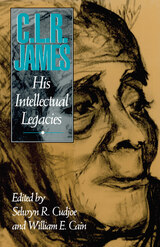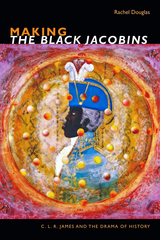4 books about C . L R James

C. L. R. James in Imperial Britain
Christian Høgsbjerg
Duke University Press, 2014
C. L. R. James in Imperial Britain chronicles the life and work of the Trinidadian intellectual and writer C. L. R. James during his first extended stay in Britain, from 1932 to 1938. It reveals the radicalizing effect of this critical period on James's intellectual and political trajectory. During this time, James turned from liberal humanism to revolutionary socialism. Rejecting the "imperial Britishness" he had absorbed growing up in a crown colony in the British West Indies, he became a leading anticolonial activist and Pan-Africanist thinker. Christian Høgsbjerg reconstructs the circumstances and milieus in which James wrote works including his magisterial study The Black Jacobins. First published in 1938, James's examination of the dynamics of anticolonial revolution in Haiti continues to influence scholarship on Atlantic slavery and abolition. Høgsbjerg contends that during the Depression C. L. R. James advanced public understanding of the African diaspora and emerged as one of the most significant and creative revolutionary Marxists in Britain.
[more]

Caliban's Freedom
The Early Political Thought of C.L.R. James
Anthony Bogues
Pluto Press, 1997
C.L.R. James (1901-1989) is one the few political thinkers whose ideas have made a genuinely significant contribution to the development of emancipatory ideas in the twentieth century. In this volume, Anthony Bogues examines the origins of the relationship between the black radical tradition and James's own view of Marxism. Integrating these two political currents provided the basis for a profound critique that became the hallmark of James’s life’s work. Anthony Bogues traces the main features of James’s early political thought, up to his deportation from the United States in the early 1950s, arguing that his work represents a major attempt in the immediate postwar period to establish new frontiers in Marxism and radical political thought in general. This illuminating and scholarly study reinforces James’s position as a political theorist of major standing.
[more]

C.L.R. James
His Intellectual Legacies
Selwyn R. Cudjoe
University of Massachusetts Press, 1995
C.L.R. James (1901-1989) made important contributions in a host of fields--literature, criticism, cultural studies, political theory, history, and philosophy. One of the most astute minds of this century, he served as mentor for two generations of international intellectuals. He contributed enormously to their understanding of the colonial question, the Negro question, the Russian question, the role of dialectics in proletarian struggle, and the theory and practice of Marxism in the Americas. In addition to The Black Jacobins, his incisive account of the Haitian revolution of the 1790s, and Notes on Dialectics, James published a range of other books, including a classic work on the game of cricket and a study of Herman Melville.
This collection of essays offers a variety of fresh perspectives on James's life and writings. Included are reminiscences of those who knew James well and critical essays by eminent scholars. The book is the first to offer a full treatment of James's many contributions to twentieth-century intellectual life.
This collection of essays offers a variety of fresh perspectives on James's life and writings. Included are reminiscences of those who knew James well and critical essays by eminent scholars. The book is the first to offer a full treatment of James's many contributions to twentieth-century intellectual life.
[more]

Making The Black Jacobins
C. L. R. James and the Drama of History
Rachel Douglas
Duke University Press, 2019
C. L. R. James's The Black Jacobins remains one of the great works of the twentieth century and the cornerstone of Haitian revolutionary studies. In Making The Black Jacobins, Rachel Douglas traces the genesis, transformation, and afterlives of James's landmark work across the decades from the 1930s on. Examining the 1938 and 1963 editions of The Black Jacobins, the 1967 play of the same name, and James's 1936 play, Toussaint Louverture—as well as manuscripts, notes, interviews, and other texts—Douglas shows how James continuously rewrote and revised his history of the Haitian Revolution as his politics and engagement with Marxism evolved. She also points to the vital significance theater played in James's work and how it influenced his views of history. Douglas shows The Black Jacobins to be a palimpsest, its successive layers of rewriting renewing its call to new generations.
[more]
READERS
Browse our collection.
PUBLISHERS
See BiblioVault's publisher services.
STUDENT SERVICES
Files for college accessibility offices.
UChicago Accessibility Resources
home | accessibility | search | about | contact us
BiblioVault ® 2001 - 2024
The University of Chicago Press









